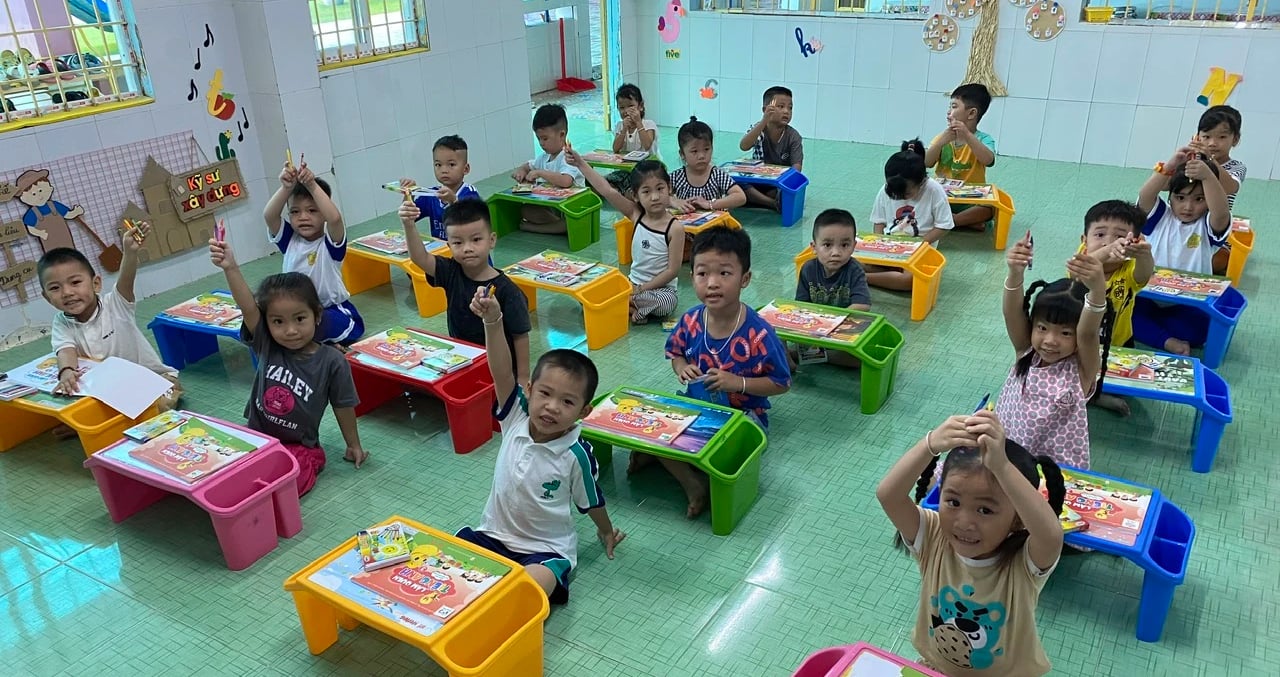
Don't focus too much on quantitative knowledge when teaching preschool children English, but help them have the opportunity to approach, create joy and interest in learning foreign languages.
For more than 3 years, I have been teaching the English introduction program for preschool children according to Circular 50/2020/TT-BGDDT of the Ministry of Education and Training with unforgettable experiences.
I remember the early days when I had to ask and observe teachers to know what activities were suitable for children at preschool age, specifically the age of buds, buds and leaves. My teaching experience in high school and at foreign language centers was considered zero in front of these young students.
Concentrate for about twenty minutes
According to the provided curriculum, I built a program for the entire course. I planned to teach double lessons to have time for practice, but when designing the lesson plan, I was doused with "cold water". A friend who is a preschool teacher whispered: "Brother, each lesson in preschool is only 25 to 35 minutes, depending on the age and it is not possible to build double lessons. Children cannot concentrate like students in elementary, middle or high school".
So I had to redesign the program and organize teaching activities to suit the psychology of preschoolers. When I got into practice, I realized that my friend was right, preschoolers can only concentrate for about twenty minutes. And during that time, I had to organize more than two activities to create interest for the children to get acquainted with English.
Through the lessons for preschool children to get acquainted with English, I have learned that teachers should not be too concerned about quantifying children's knowledge and language skills. Help children have the opportunity to approach and get acquainted with English, create joy and interest in learning foreign languages. This will be the premise for learning English at the next levels.
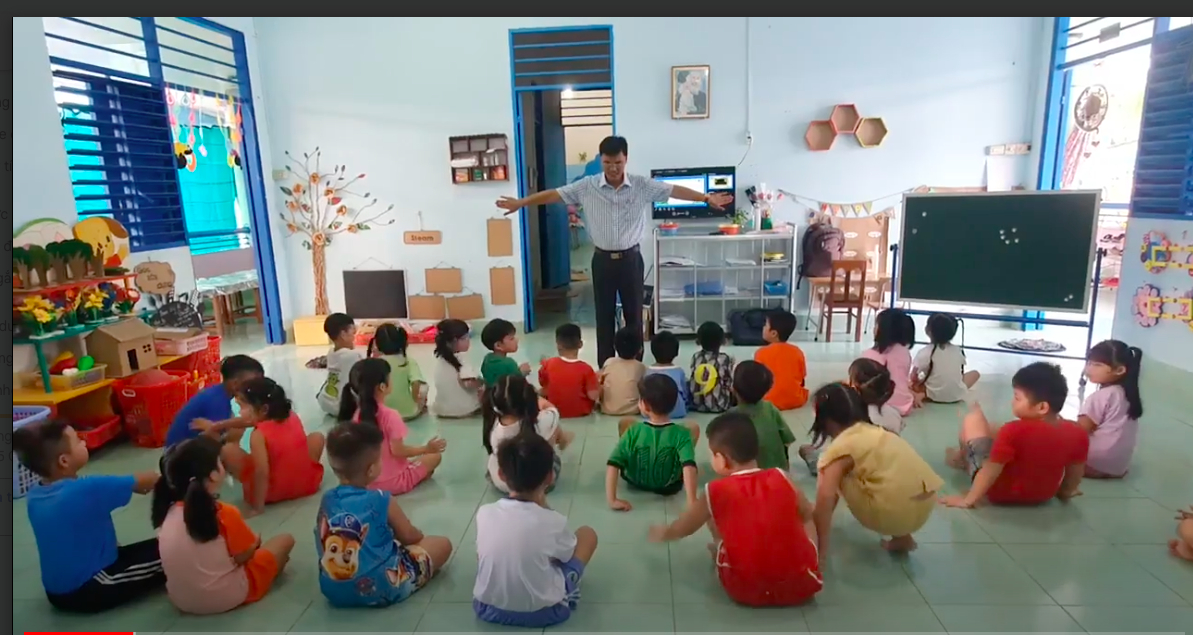
The author wrote this article in an activity to introduce children to English.
Through learning, teachers encourage children to boldly participate in activities to practice the habit of being bold, less shy, more active in communication and participating in other school activities.
Familiar vocabulary is repeated with games, songs... to give children time to practice and gradually build confidence, thereby helping them absorb the language in their own way. Gradually, preschool children will form language skills naturally.
Teachers' language and communication attitude must be appropriate.
Teaching English to children helps me gain more experience in "softening" the education of my students. When organizing and participating in activities with children, the language and communication attitude of teachers must be appropriate. For example, teachers do not use the word "you" to call children, but must use "you".
The most important thing is not to get angry while teaching the children. You have to coax them to participate in the activities and sometimes you have to transform into characters like Mickey Mouse, Tom Cat or Donald Duck to create situations for the children to practice. Many times, I have to laugh because of the innocent and cute words of the children: "Teacher, you look so much like my grandfather". And that's okay because the children's parents were my students in high school.
There were a few days when I was sick, so the learning activities were not as exciting as usual. I was touched when I received many questions from the young students: "Why are you so sad today, teacher? Are you sick?"
Teaching English to kindergarteners is great. It can be a little awkward at first, but if you are trained and complete professional development programs in early childhood education... you will get used to it and will definitely love it.
Which teachers are qualified to introduce preschool children to English?
According to Circular 50/2020/TT-BGDDT of the Ministry of Education and Training, Vietnamese teachers are eligible to participate in organizing activities for preschool children to get acquainted with English when they meet one of the following standards:
- Have a college degree or higher in English pedagogy or English language; have completed a professional training program on preschool pedagogy or methods for introducing children to English organized by universities and colleges that train preschool teachers (minimum program of 120 periods, including at least 45 practice periods at preschool education facilities).
- Have a college degree or higher in preschool education, have an English proficiency certificate at level 4 or higher according to the 6-level foreign language proficiency framework for Vietnam issued with Circular No. 01/2014/TT-BGDDT dated January 24, 2014 of the Minister of Education and Training (or equivalent according to regulations).
Foreign teachers and native teachers must also meet specific conditions and criteria.
Thuy Hang
Source link



![[Photo] Solemn opening of the 1st Government Party Congress](https://vphoto.vietnam.vn/thumb/1200x675/vietnam/resource/IMAGE/2025/10/13/1760337945186_ndo_br_img-0787-jpg.webp)








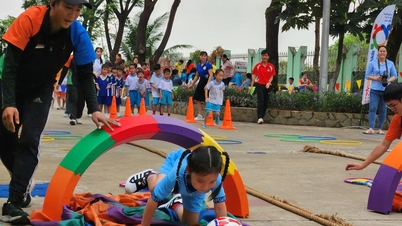










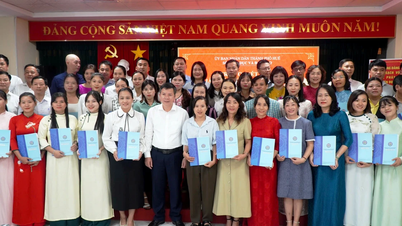






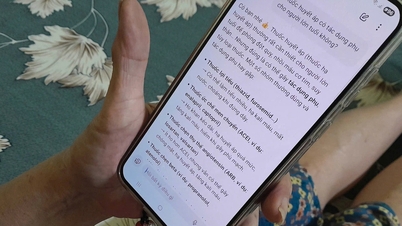





![[Photo] General Secretary To Lam attends the opening of the 1st Government Party Congress](https://vphoto.vietnam.vn/thumb/1200x675/vietnam/resource/IMAGE/2025/10/13/1760321055249_ndo_br_cover-9284-jpg.webp)












































































Comment (0)